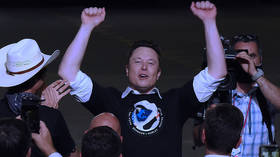Elon Musk, less eccentric icon more con artist, represents the entire smoke-and-mirrors game of the US financial market

The world’s newly-crowned richest person built his fortune on Tesla, a grossly overvalued company that sells about 500,000 cars a year, yet is worth vastly more than Toyota, which sells 11 million. He’s bubble boy extraordinaire.
Tesla CEO and SpaceX founder Elon Musk recently overtook Amazon’s Jeff Bezos as the world’s richest person, a feat that happened largely in the span of less than a year. However, Musk, the eccentric billionaire with a wannabe Tony Stark image, is highly misunderstood – just like the circumstances of his wealth are. In many ways Musk’s meteoric rise this year – a rise that is based on no solid foundation – is a microcosm for the entire US financial system.
On the day that Musk overtook Bezos in net worth, January 7, his wealth stood at about 195 billion US dollars, which is 10 billion more than Bezos’, after Tesla’s shares had jumped eight percent that day. But here’s the thing about Musk’s wealth: it is tied almost entirely to Tesla. That is to say that Musk does not have 195 billion dollars in cash; he only has wealth on paper.
Also on rt.com Slavoj Žižek: Elon Musk’s desire to control our minds is dehumanizing and not what is needed in a socially distanced worldIn fact, signs of the billionaire being cash poor have already shown and were widely reported. On May 1, he tweeted that he would sell “almost all physical possessions” and “own no house,” which was seen by some as on-brand eccentricity but is really a sign that Musk sees a looming financial reckoning, which is evident by the fact that he also said Tesla stocks are “too high” in that same tweet storm. (He has even been quoted in court documents admitting that he doesn't have that much cash and has “debt against” his SpaceX and Tesla stock).
This was a keen assessment by Musk and was even stated before Tesla made some major moves later in the year. In December, JP Morgan analysts advised against buying Tesla shares in the lead-up to the company joining the S&P 500 at the end of that month.
“We recommend investors not weight Tesla shares in their portfolio in equal proportion to the S&P because Tesla shares are in our view and by virtually every conventional metric not only overvalued, but dramatically so,” the bank said, justifying their assessment based on the fact that Tesla primarily makes money from selling emission credits – a revenue stream that is being dried up – and the fact that they simply could never sell enough cars to justify their current market capitalization.
It seems that investors simply aren’t aware of what they’re investing in and how to properly value it, which is actually a problem at the heart of the entire US financial market right now. Billionaire investor Jeremy Grantham noted on January 5 that the US is in an “epic bubble” because of extreme overvaluation, dramatic price increases and hysterical speculation.
It echoes virtually the same analysis from Michael Burry, the famous investor portrayed by Christian Bale in The Big Short, in September of 2019. According to Burry, passive investment is the next big bubble that will crash hard.
The logic here is straightforward: if investors are not actively managing their portfolios and investing in, for example, entire indexes, then it becomes difficult, if not totally impossible, to properly value shares.
The problem is directly compounded by the fundamental unpredictability of the Covid-19 pandemic, the current political turmoil in the US and the fact that the data-driven futures market isn’t even properly understood by the general public. It means that the traditional means to properly value companies and assess market capitalization, such as by gauging future return, becomes almost impossible.
There is no greater example of this, i.e. a grossly misvalued company, than Tesla and, again, Elon Musk knows this. During the aforementioned May 1 tweet storm, he responded to one user assuring them that he doesn’t need the cash, which is probably not true. He has since doubled down on this narrative, telling Mathias Döpfner, the CEO of Axel Springer, that he would sell all his possessions in a bid to get serious on colonizing Mars.
To the untrained eye, this is a man who is so deeply dedicated to his mission for humanity that he wants to give up everything – literally everything – to achieve it. The reality is that he wants to sell what he can before the bust happens, leaving him with a few scraps of dignity and the wherewithal to divert his energy to SpaceX – his other venture that is not publicly traded – after Tesla sinks.
In a way, Musk represents the entire smoke-and-mirrors game being played in the US financial market. He has the persona of an eccentric futurist that sees the light before the rest of humanity and electrifies us with hope in the future, but in reality he’s actually a con artist that plays on humanity’s technological optimism. Perhaps the most poetic part of this dangerous game is that he literally has the most to lose out of anyone.
Think your friends would be interested? Share this story!
The statements, views and opinions expressed in this column are solely those of the author and do not necessarily represent those of RT.














